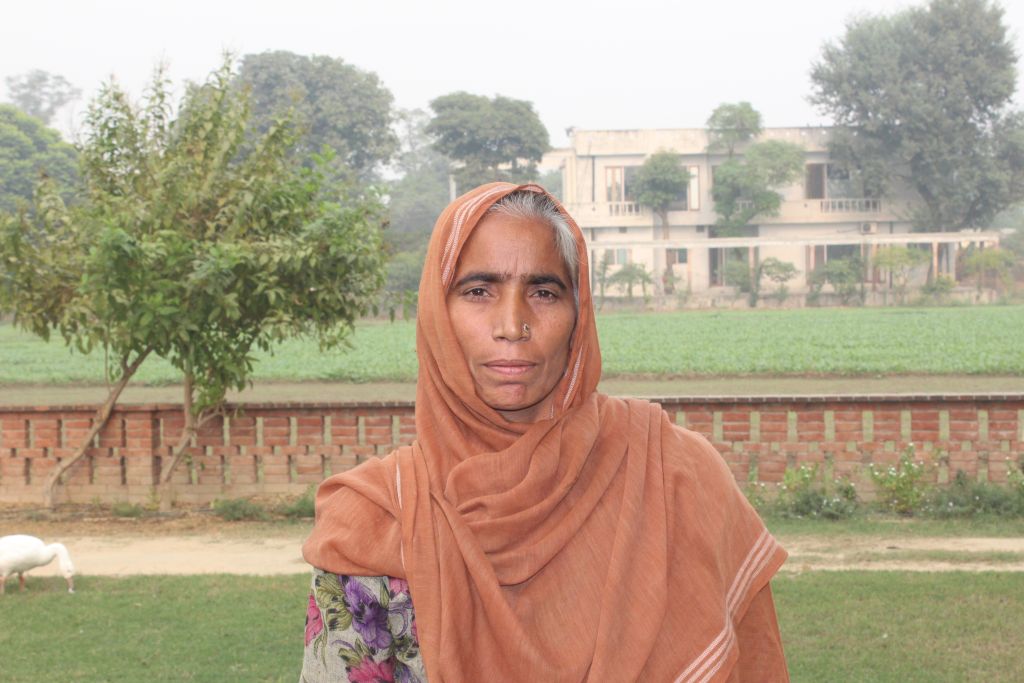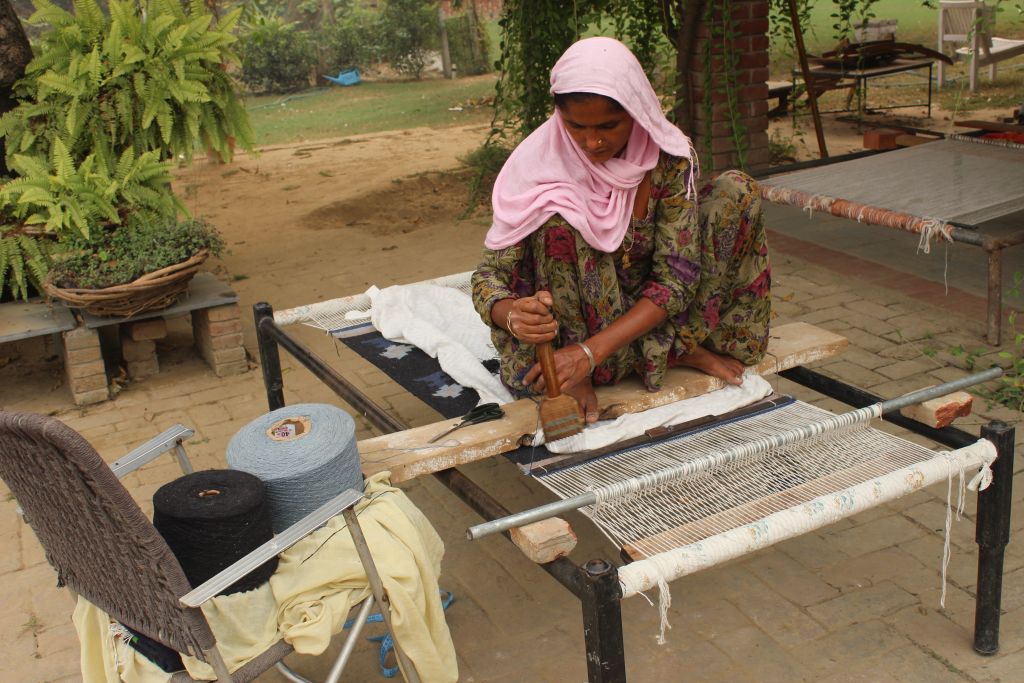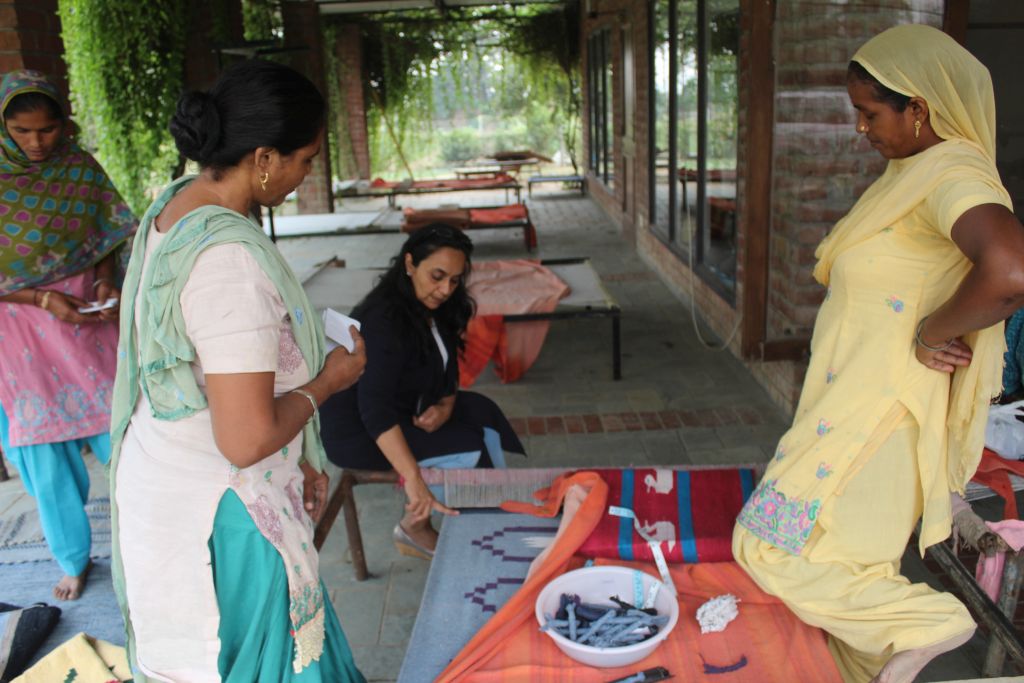It is late evening when Malkiet eagerly settles down at her adda (loom). It’s her favorite time of day; it’s also her favorite corner of home. Picking up a heavy, wood-handled metal claw called a panja, she begins to deftly beat back the cotton weft into the warp strung across a horizontal frame. The more she beats, the sturdier the durrie (rug). “The sturdier the durrie, the closer to 'Didi-compliant' it is likely to be”, she chuckles to herself, thinking of her employer, hand-holder, advisor, and mentor Kiran Grewal who she affectionately refers to as “Didi”, meaning “elder sister” in Hindi.
Watching the buttis (floral motifs) take shape as they inch their way across the warp towards the far end of the loom never fails to ignite in Malkiet an immeasurable sense of joy. After all, this traditional craft has in part helped her pay off the bank loan her husband saddled her with when he abandoned her and their three children over a decade ago.
In the twelve years since, she’s worked hard to become debt-free, educate her children, marry her daughter off, and add four rooms to her one-room tenement, all singlehandedly. “No. That’s not quite true”, she corrects herself during our conversation. “None of this would have been possible without Didi.”
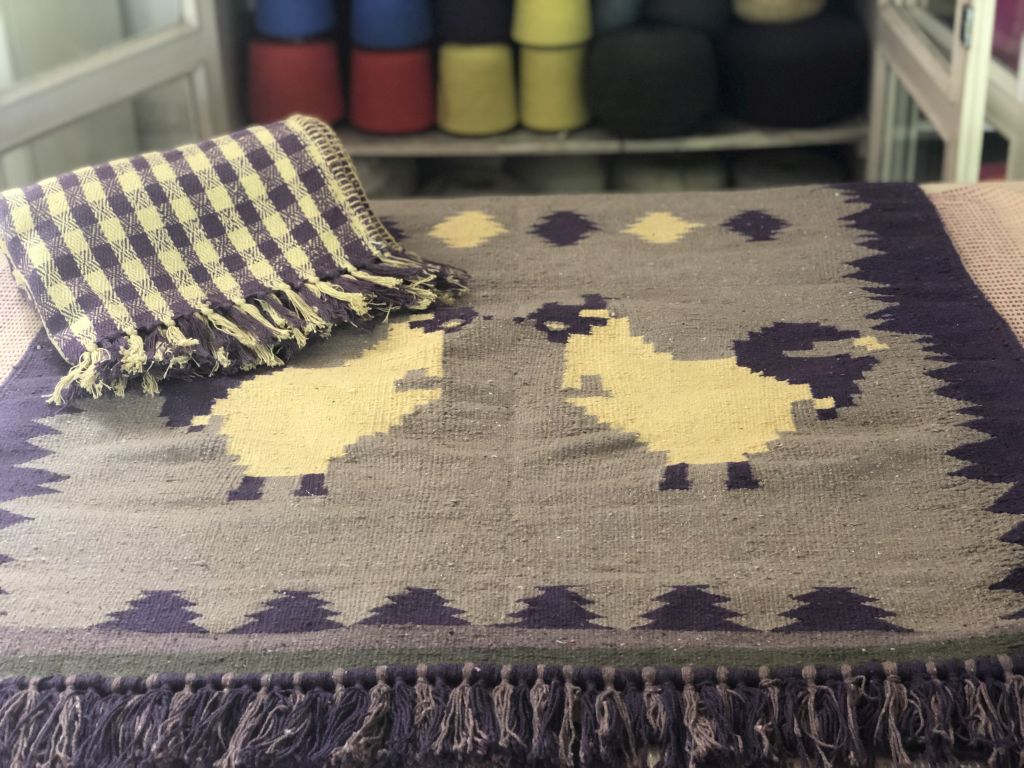
Back to Roots
Better known to the world as Kiran Grewal, “Didi” left her job as a Mumbai-based advertising professional to move back to Punjab with her husband, Ranbir. They subsequently built themselves an eco-friendly brick house in Balwaar, his ancestral village in the district of Sangrur, and started life afresh as farmers.
Once settled, the enormously creative Kiran set out to launch her line of embroidered home linen. Prompted by her mother, a well-known couture professional in these parts, Kiran let it be known to the village grapevine that she wished to take on local talent.
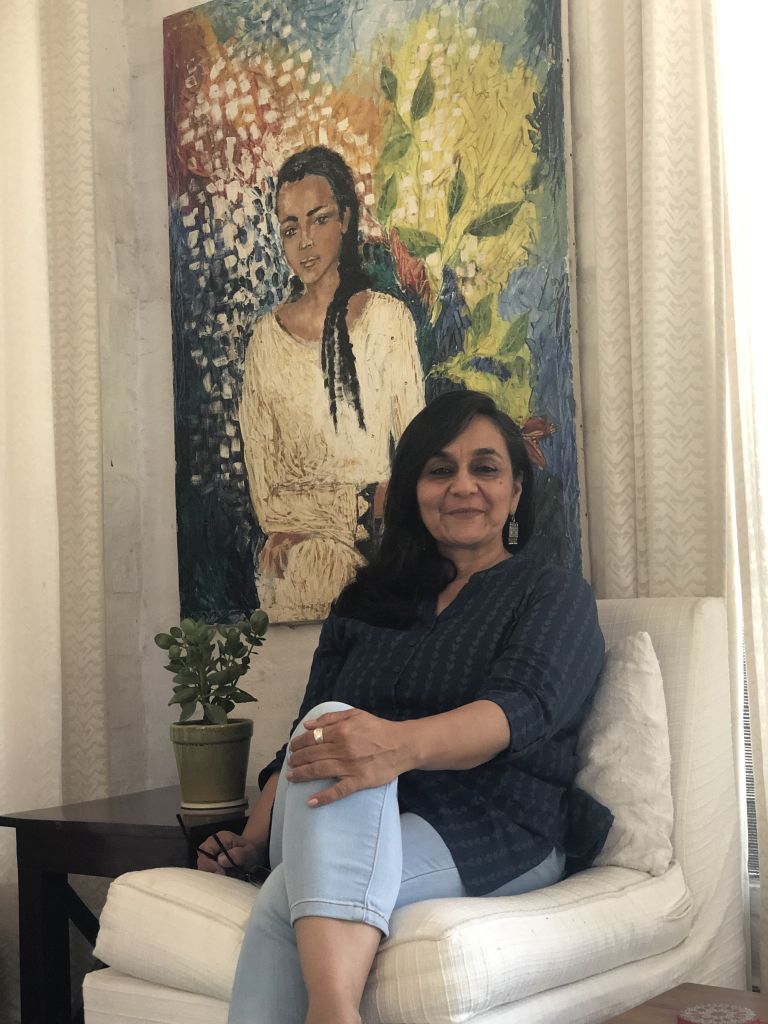
“I was, in reality, living my mother’s dream," says Kiran. "She had always wished to engage with rural women, to offer them an easily sustainable livelihood. Better still, from the comfort of their homes, and in whatever little time they could spare. We both believe a lack of constraint and pressure is most conducive for creative juices to flow.”
It was around that time that the unlettered Malkiet Kaur came into her life. She was one of four women who first joined Balwaar, Kiran’s newly-minted bespoke linen brand. Fifteen years later, some 25 trained and skilled women are beneficiaries of a sustainable income model based on the number of embroidered pieces they turn in each month.
Travailing Tradition
Kiran shows me around her neat studio set to the back of the main house, its shelves spilling design books, templates, rainbow-hued yarn and an array of finished products including dainty cross-stitched and crochet-edged tea cozy sets; thick, cotton top sheets called khes which have been hand woven in brilliant shades, soft to touch and snug to feel; and multi-colored durries, flat-woven, foldable floor coverings speckled with stylized and realistic motifs.
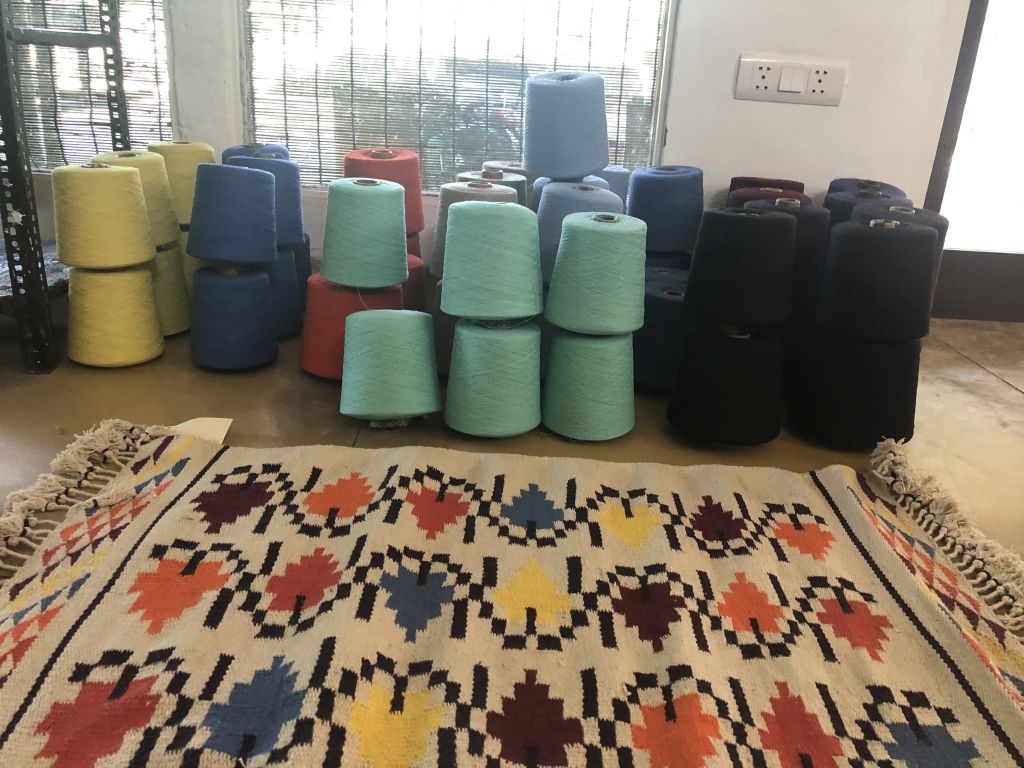
The latter two have long been an integral part of a Punjabi bride’s trousseau. Traditionally, they’re woven by the mother and passed on to her daughter at the time of her marriage as the bistra (bedding). While the fringed khes used to be typically mono-chromed or dual-tone checkered, the bridal durrie’s brilliance was limited only by the weaver’s imagination: scenes from daily life, flora and fauna, figures from folklore, geometric designs – all breathed to life by a mother’s love.
“I was always interested in weaving. With the home linen section pretty much running itself, I decided to switch gears, reaching out yet again to the rural community. The results, to put it mildly, were very discouraging”, Kiran recalls of the time, a couple of years ago, when she called for weaving samples.
“There were hardly any women who came forward. That I could understand, as weaving is more time-intensive than embroidery. What was more disturbing was that the craft had none of the complexity of yore, the finesse neither, and the colors were completely off.”
Concerned at this apathetic languishing of a longstanding and poignant practice, Kiran along with a friend, Priya RP Singh, decided to become a small part of the change they wished to see. And so the Cocoon Foundation was formed, under the aegis of which skilling and training workshops are organized. It also provides looms and raw material to the ten women thus engaged.
“I think I’ve found my calling,” voices a smiling Kiran. “Nothing has given me more pleasure in recent times than being a tiny catalyst in the revival of this craft. Equally, the new-found interest it has garnered in the next generation,” including Malkiet’s own daughter. Just months into motherhood herself, she can’t wait to begin weaving a bridal durrie for her own young daughter.
Testing Times
Malkiet remembers her disastrous early attempts at weaving. “Even though I’d woven nearly 30 durries in my 45 years, I couldn’t match Didi’s standards of excellence,” she recalls. Still, she wasn’t going to let that slight slack in the warp and weft defeat her, not when life had tried and failed. Indomitable by nature, Malkiet had found a champion in her equally resolute mother-in-law. The older lady didn’t simply disown her errant son; she also transferred his share of land to her daughter-in-law, an unthinkable gesture in a deeply patriarchal society.
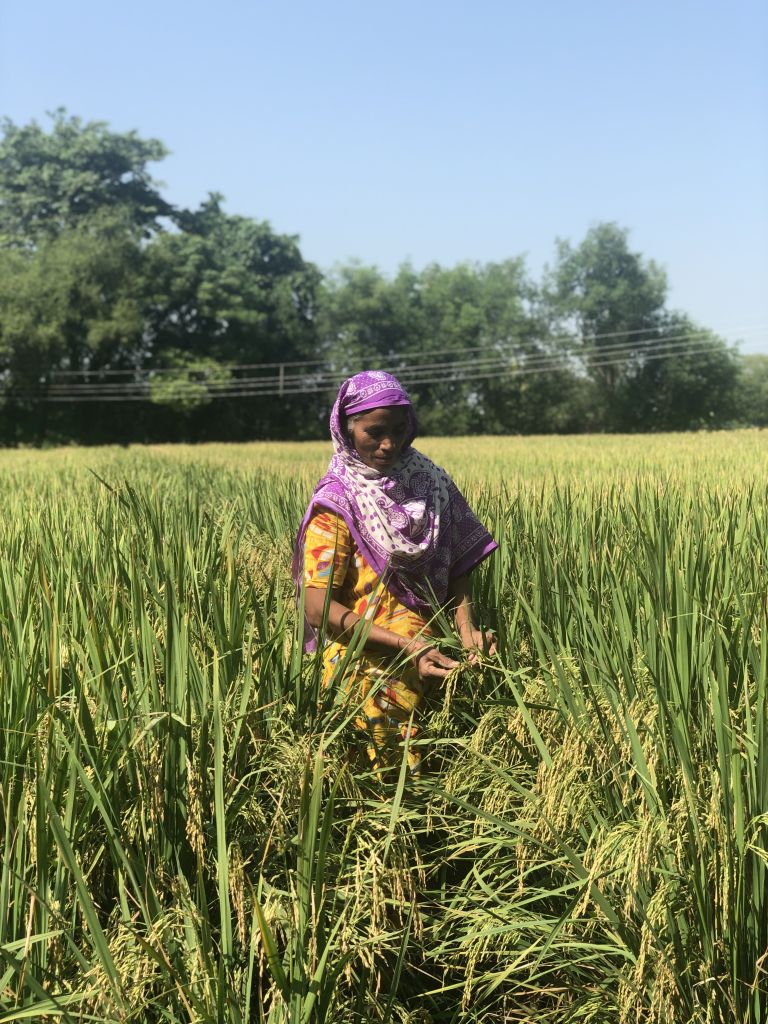
Malkiet has since proudly ministered the one-acre parcel of land by herself, using the income from the bi-annual harvest to pay off her debt. The monies from selling her buffalo milk take care of monthly expenses, alongside the remuneration she receives from Kiran for lending a hand with daily household chores. Her day begins early, at 5 am, offering little respite till late evening, when she finally sits down at the loom. She eagerly picks up the wood-handled panja and beats her dreams into cathartic, ancient shapes which have happily become the fabric of her life.
Photos courtesy of Balwaar
About the author

Travel. Eat. Write. Repeat. This has been Puneetinder Kaur Sidhu's motto in her twenty years as a travel and food writer. She borrows from Lao Tzu to best describe herself as a traveller with no fixed plans, and no intention of arriving. When she is not travelling, she's dreaming up ways to hit the road. Follow her adventures on Facebook.

